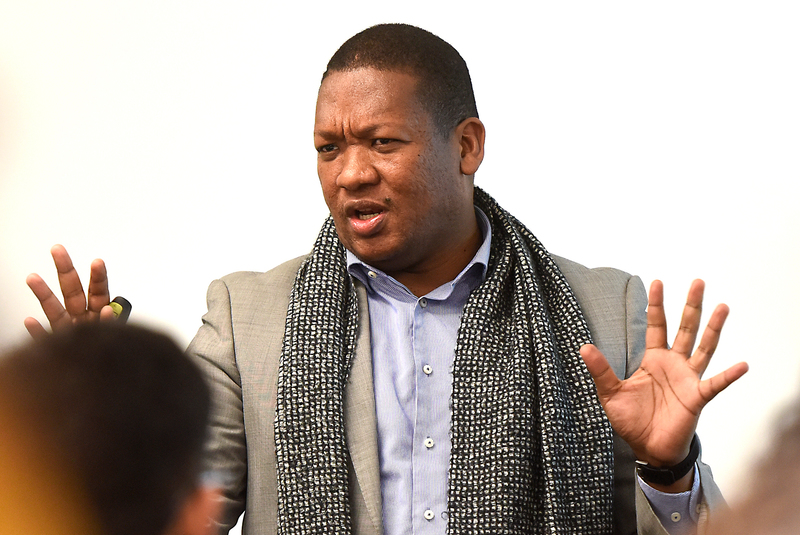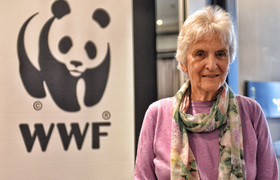‘In your face’ water-saving campaign
29 July 2019 | Story Sarah Middleton. Photo Brenton Geach. Read time 5 min.
When the University of Cape Town’s (UCT) senior marketing and stakeholder relations manager Aloy Gowne outlined details of the award-winning “Slow the Flow” campaign, he revealed the intention of literally “annoying” the campus community into action.
Gowne, who is based in the Communication and Marketing Department (CMD), was sharing an inside view on the strategy, and its implementation, with business communication students on 25 July.
“I want to put it on record – I’m not a spin doctor, and I’ve never been one. I don’t believe in spin doctoring,” he said, making it plain that when it came to the 2018 water crisis, CMD’s tactic was far from spinning a story.
Instead, the aim was to “flood” their primary stakeholders – students and staff at UCT – with the message that water usage had to be reduced.
“If you go to the website, you will see an annoying little thing that comes up, so it’s in your face. That was really the point – we wanted to be in your face,” he said during his address
Changing behaviour
“We wanted to change behaviours to the extent that water usage was reduced, and so we could also contribute to the savings efforts of the City [of Cape Town] itself.”
“That was really the point – we wanted to be in your face.”
The “Slow the Flow” campaign, which was first implemented in March 2018, splashed its message across a multitude of media platforms with the objective of cutting water consumption by half.
The urgency with which the CMD acted was symptomatic of the greater crisis faced by Cape Town.
“People all over the world thought that Cape Town was going to be a disaster zone,” said Gowne.
UCT was one of the cityʼs major consumers of water, he explained, with serious implications for the university’s budget.
“Our residences were especially heavy users.
“[This] means that you have to probably take money from student funding, which will get rerouted towards paying just for water.”
The CMD’s response was defined by the particular situation at hand, Gowne said.
“Whenever you look at a campaign situation or a problem, it is [the problem] that defines where you’re going to go next.
“So that’s how this came about: the ‘Slow the Flow’ campaign.”
Sustainable solutions
Although “Slow the Flow” responded to an immediate threat, the message was designed to have longevity and to be effective in years to come.
“Whenever you look at a campaign situation or a problem, it is [the problem] that defines where you’re going to go next.”
“The message is really about coming up with sustainability for the future. It’s not a short-term thing to say ‘Day Zero is now but it’s going to end’.
“[Water scarcity] is an issue worldwide. There are [other] cities in the world also struggling with the same issue. There are articles saying that other cities can learn from how Cape Town dealt with this crisis.”
The campaign’s success lies partly in its careful budget management. The budget allocated to the campaign was “very tiny”, less than R250 000, so it was important for the effects to be as long-lasting as possible.
Gowne told the students that “this isn’t a short-term campaign where after a month it goes flat, because then you can’t justify the R250 000 you spent”.
“We are still using [materials] that we paid for last year because it’s a long-term programme.
“You use that budget once, but you roll [the campaign] out over the next five years.”
Gowne explained that evaluating the success of any marketing or public relations campaign is essential. The preliminary data show that UCT cut water consumption by over 20 000 kilolitres between April 2017 and April 2018, one month after the campaign began.
“As soon as we implemented [the campaign] in March, the April usage started coming down.”
“As soon as we implemented [the campaign] in March, the April usage started coming down.”
It was not “Slow the Flow” alone that effected the change, however.
“We can’t attribute this only to the campaign; there were so many implementing partners. The campaign is not the only factor that contributed to that reduction, but it supported the call to reduce our water reduction,” he explained.
The team at CMD bagged a number of awards for the “Slow the Flow” campaign, garnering two gold medals and a special award at the Marketing, Advancement and Communication in Education (MACE) annual congress, and an award from the International Association for Business Communication (IABC).
 This work is licensed under a Creative Commons Attribution-NoDerivatives 4.0 International License.
This work is licensed under a Creative Commons Attribution-NoDerivatives 4.0 International License.
Please view the republishing articles page for more information.










